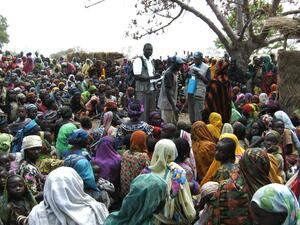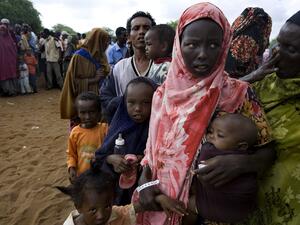Afghanistan: record numbers fleeing to Pakistan, again
Afghanistan: record numbers fleeing to Pakistan, again
For the third week running, a record number of Afghan refugees crossed into Pakistan to escape the escalating fighting in north-eastern Afghanistan. From 1-12 October, 3,783 Afghan refugees entered Pakistan at the Torkham border post - 2,127 children, 943 women and 713 men. Between Sunday and Thursday, UNHCR monitors at Torkham observed some 2,101 new arrivals, the single largest one-week influx this year. The refugees are predominantly Dar speaking and are of Tajik ethnicity.
UNHCR has also located 130 refugees in Chitral in north-western Pakistan. They came from Taloqun in north-eastern Afghanistan, headquarters of the opposition Northern Alliance which was captured by the Taliban on 6 September. The refugees said they travelled 600 km from Taloqun to Chitral in 25 days, trekking through the rugged Hindu Kush. The arrivals were exhausted, traumatised and in a very poor state. They said the battle for control of Taloqun was the heaviest they had witnessed in recent years. They spoke of many casualties. These refugees have been moved to Khairabad camp in Thiral, where they had repatriated from in 1992. UNHCR has provided them with tarpaulins, plastic sheets, kitchen sets, jerry cans, stoves and tea. The camp has adequate health and sanitation facilities.
Some 16,000 Afghan refugees from the fighting in north-eastern Afghanistan have arrived in Pakistan. The average number of arrivals in the past several weeks was 2,000 per week. UNHCR has been moving the new arrivals from Jalozai, near Peshawar, where they had encamped, to the new Shamshatoo refugee village. On Thursday, a convoy of 26 trucks transported the first group of 2,650 refugees to Shamshatoo. The second group of 2,485 refugees was being transported today. Another 2,950 will be taken there tomorrow from Jalozai.
Upon arrival in New Shamshatoo, the refugees were provided with tarpaulins, quilts and plastic sheeting. WFP handed out 95 kgs of wheat flour and 5 kgs of edible oil to each family.




